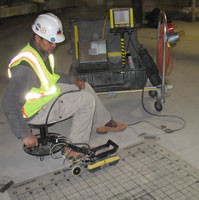
There are a lot of questions when it come to the operation and application of ground penetrating radar.
GPR is a highly useful technique for avoiding structures beneath the concrete during the drilling process. It can detect PVC, metal pipes, and rebar so that your construction crews can safely drill into concrete. Whether you’ve used ground-penetrating radar before or if this is your first time, you may have some questions about how it works and under what circumstances it functions. Today we’ll be answering some questions that you may have. Let’s take a look.
How does ground-penetrating radar work and is it safe for workers?
You take the machine and run it over the area that you need to examine. The machine exhibits a small pulse into the ground using an antenna. The computer within the device then records the strength of the reflected pulse and the time it took to return, which allows it to measure the size of the embedded object as well as its depth. This information is then stored to be interpreted later. This process is completely safe for your employees. The machine itself exhibits a very weak signal that doesn’t even measure up to a cell phone’s.
Can GPR work through water?
It absolutely can, but only if the water is fresh. Saltwater doesn’t allow for ground-penetrating radar to function properly. Ice and snow offer very favorable conditions for GPR machines to collect data.
Do cell phones affect the way the GPR works?
The antenna that collects your data is listening out for the same kinds of frequencies used by cell phones, pagers, and other communication devices. Using those devices near the GPR can affect the data it receives and thus, affect your results. Cell phones should be at least 20 feet away from the machine, or off.
Do you need help with ground penetrating radar from Concrete Visions?
Concrete Visions has over 12 years of experience and expertise in concrete scanning and we know how to detect any problems lurking beneath the surface. We use ground penetrating radar accurately and expertly and are familiar in many other methods that can be used when appropriate like concrete x-ray and electromagnetic conductivity. We are also very familiar with the latest construction safety techniques and train all of our workers to do their work quickly, accurately, and safely. If you would like to learn more about how we can help you, give is a call at (410) 766-2210 or visit us online. For more articles and tips, follow us on Facebook, Twitter, LinkedIn, and Google+.
